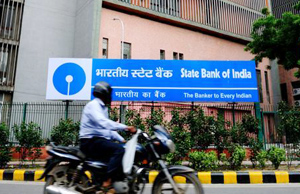Mumbai, Sep 29: Within couple of hours of rate cut by the Reserve Bank, country's largest lender SBI slashed its lending rate by 0.40 per cent, while the largest private sector lender ICICI Bank hinted at cutting its base rate by at least 0.25 per cent.
"Clearly, interest rates will come down, base rates will come down. A large part of the cut will get transmitted. When I say a large part of the thing (repo rate) will get transmitted, it should mean more than half," ICICI Bank's managing director and chief executive Chanda Kochhar told reporters at the RBI headquarter
SBI chairman Arundhati Bhattacharya was not present at the customary post-policy press conference organised by banking industry lobby grouping IBA, but her bank announced a 0.40 per cent cut in its lending rates to 9.30 per cent from October 5 onward, right afterwards.
She said on a TV channel that she expects a hit of up to 0.11 per cent due to the rate cut and it may also cut its deposit rate by 0.25 per cent.
Drawing attention to statements by RBI Governor Raghuram Rajan on reviewing small saving rates, which was followed by one from Finance Minister Arun Jaitley declaring a cut, Dena Bank chief and IBA's newly elected chairman Ashwani Kumar said it is clear that factors beyond cost of deposits govern the bank's rate strategies.
He added that the interest rates from the small saving schemes like PPF, NSC etc is one of the major impediments for the rates being higher.
Uday Kotak of Kotak Mahindra Bank said he would welcome if the small saving rates are cut by a similar measure of 0.50 per cent to around 8.25 per cent level.
"Saver has a psychological issue if it goes below 8 per cent. It starts getting tougher to get money unless he is made to understand that inflation rates are dropping significantly," he told a news channel.
He added that it's a matter of days before his bank, the fourth largest from the private sector, announces a rate cut.
"Of the 75 per cent cut that has happened (before today's cut), about half has been transmitted, this half will get transmitted soon," private sector lender Axis Bank's head Shikha Sharma said on the channel.
Kochhar said the reduction in base rates always happens with a lag and added that her bank already uses the marginal cost of funding formula for deciding its rates.
She also welcomed other initiatives announced in the policy like increasing the FPI limits and other decisions in the run-up like having an empowered committee among joint lenders forum.
Kochhar pitched to ensure this does not make the JLF or joint lenders forums more bureaucratic in their functioning and decisions get taken fast.
HDFC Bank's Aditya Puri, who had the most aggressive rate offering before SBI's cut, said the positive side of the policy is that rates will come down more, and also welcomed other facets of the policy which make recovery easier and the clarity on liquidity.
"Rajan has frontloaded the rate cut and committed to continue with an accommodative monetary policy. This will certainly work as a booster dose for economic growth," founder and managing director of Bandhan Bank, C S Ghosh said.







Comments
Add new comment